|

HOME |
ABOUT | INDEX |
NEWS |
FACEBOOK |
CONTACT
DEADNAMING
Misgendering | Former Identity | Previous Name
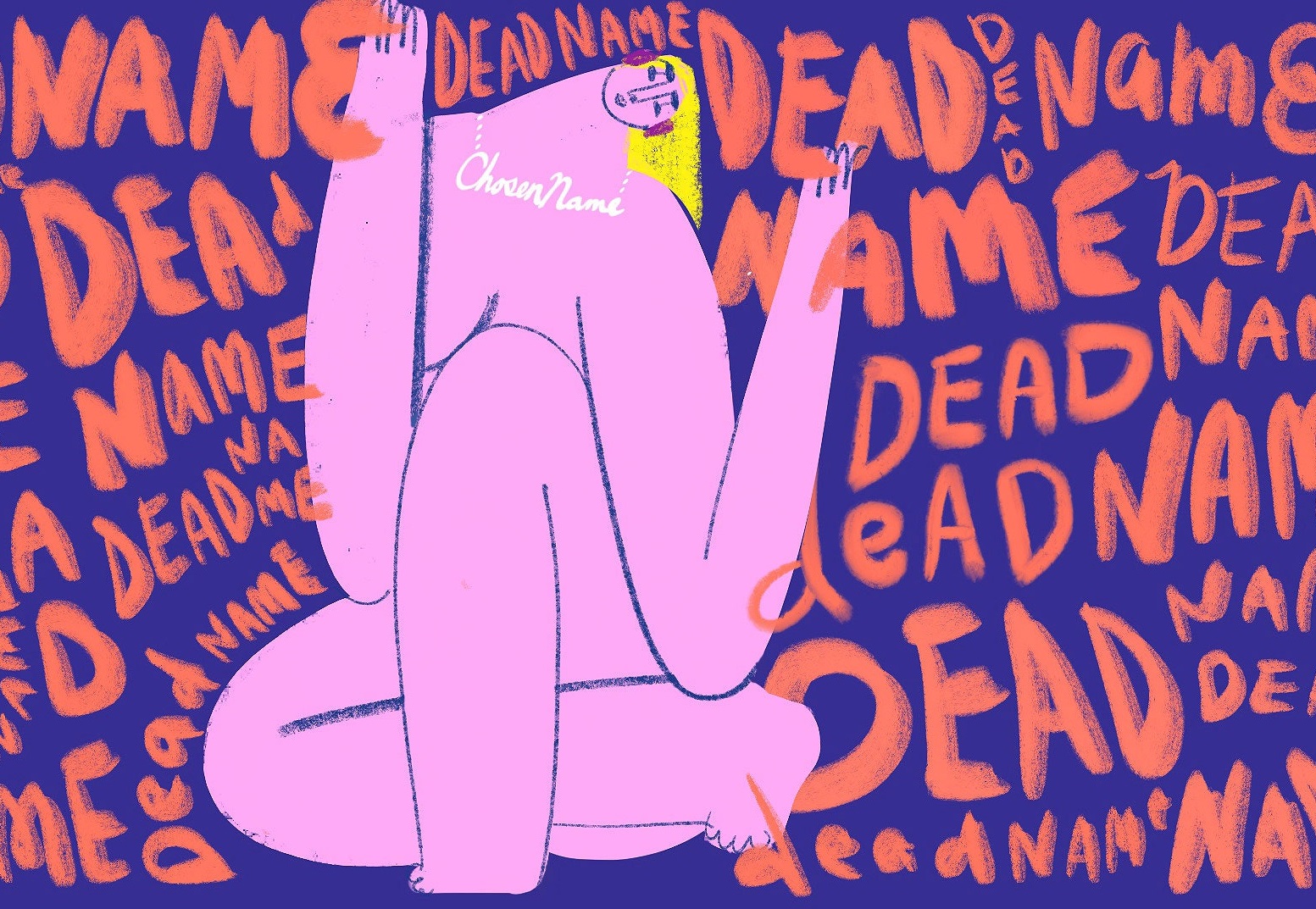

Preferred Gender Pronouns
Gender Identity
Gender
Expression
Genderqueer|Gender Fluid
Respectful Language

Transition
Challenges
"Deadnaming" is the act
of referring to a transgender person's birth name
instead of their chosen name. It is the practice of
uttering or publishing the name that a transgender
person used prior to transition.
Most of the time, an
individual will pick a new name as soon as they begin to
identify as the gender they know they are on the inside.
This new name, in a way, marks the "death" of their old
identity and the person they once were. With a new name,
they signify a new, more truthful, and more fully
realized phase of their life.
To be
accurate, a deadname, or "necronym," is a false name.
A trans person's new name is better described as
their real name or their true name (their
authentic identity).
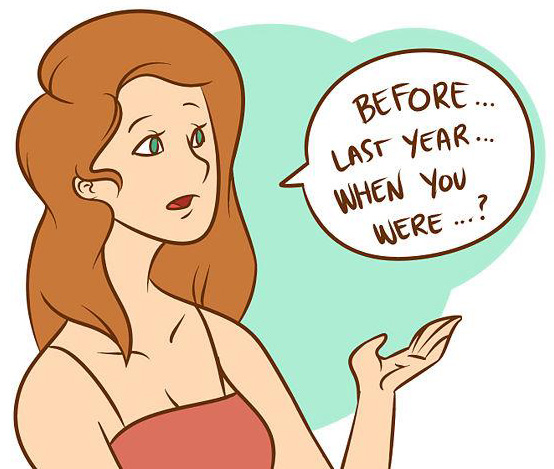
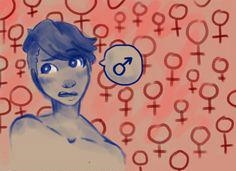
Deadnaming a Trans Person is
Psychological Violence
James: Starbucks Trans Ad
What Does 'Deadname' Mean?
Why is Deadnaming Harmful?
Don’t Deadname Caitlyn Jenner
Deadnaming: Referring to Myself in Past
Tense
Laverne Cox: Deadnaming and Misgendering Trans People
Words Matter: Deadnaming and Suicide
We Need to Stop Deadnaming Trans People
Health Line: What Does It Mean to
Misgender Someone?
Video: Misgendering is an Act of Violence
For many people who are
transgender, undergoing a name change can be an
affirming step in the transition process. It can help a
transgender person and the people in their lives begin
to see them as the gender they know themselves to be. It
can also alleviate discomfort that may be associated
with one’s old (former, previous) name.
Genderqueer (genderfluid)
people may also elect to change their name (or pronouns)
as a way of feeling more authentic and affirmed in their
identity.
Transgender and
genderqueer people really want other people to forget
their previous name. Unfortunately, many people may
struggle to adhere to a transgender person’s new,
affirmed name. In some situations, other people may
refuse to acknowledge the change altogether. And in
situations that involve official identification, having
a legal name that doesn’t align with one’s affirmed name
can cause people serving in official capacities
(administrators, employers, government officials, legal
entities) to inadvertently refer to a trans person by
the wrong name or gender.
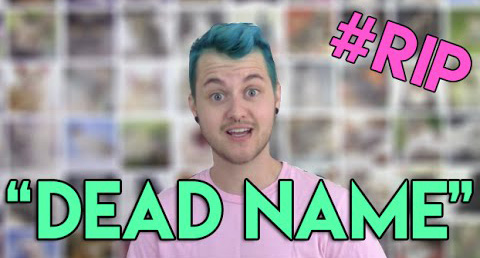
Uninformed cisgender
(straight) people might comment about a trans person’s
“real” name, as if the new name a trans person uses is
somehow less real than the one given to them at birth,
when they were assigned male or female. It is seen as a
verbally violent offense that attempts to invalidate a
person’s authentic gender identity.
Deadnaming occurs when
someone, intentionally or accidentally, refers to a
transgender person by the name they used before they
transitioned. You may also hear it described as
referring to someone by their “birth name” or their
“given name.”
Regrettably, deadnaming
is often employed as a transphobic way to demean and
deny a transgender person's true expression of self.
It can occur,
intentionally or accidentally, anywhere in a transgender
person’s life, from personal relationships to the
classroom or workplace.
Deadnaming a Trans Person is
Psychological Violence
James: Starbucks Trans Ad
Why is Deadnaming Harmful?
Don’t Deadname Caitlyn Jenner
Info: Transgender Issues
Health Line: What Does It Mean to
Misgender Someone?
What Does 'Deadname' Mean?
Deadnaming: Referring to Myself in Past
Tense
Words Matter: Deadnaming and Suicide
Info: Preferred Gender Pronouns
We Need to Stop Deadnaming Trans People
Video: Misgendering is an Act of Violence
Info: Respectful Language
Finding Your Name
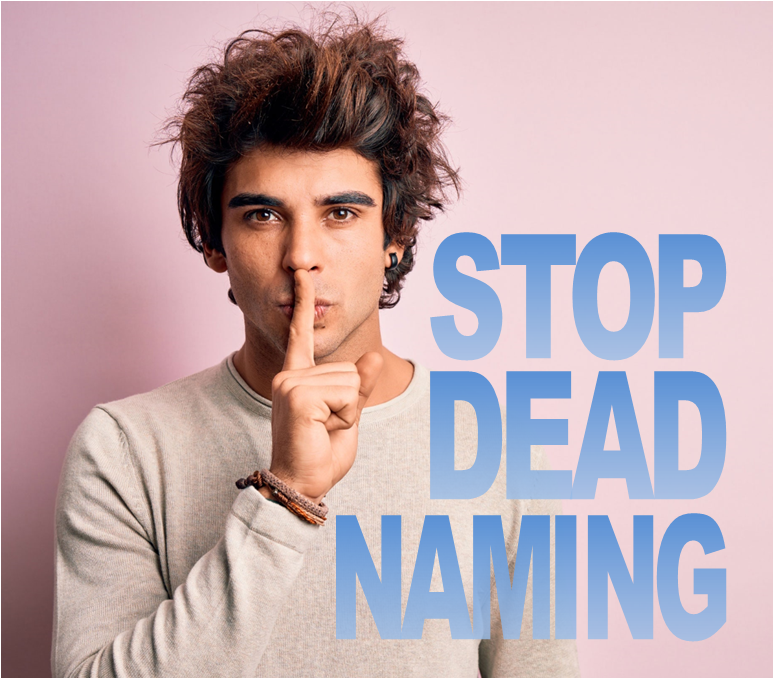
Why Deadnaming Occurs
--Someone accidentally
(unintentionally, unconsciously) deadnames a trans
person because they are used to using the old name out
of habit and they are still adjusting to the new name.
For example: John calls his transgender sister "Alan" by
accident because he had referred to her as that for most
of his life. He sincerely apologizes and corrects
himself.
--Someone accidentally (unintentionally, unconsciously)
deadnames a trans person because they forgot or were not
paying attention and simply made an honest mistake. For
example: Matt, who is an ally and totally understands
the importance of using
preferred names and
pronouns, calls a transgender male colleague by his
deadname by accident because was distracted or
preoccupied in the moment. He sincerely apologizes and
corrects himself.
--Someone purposefully
(intentionally, deliberately) deadnames a trans person
to cause distress, in the way a bully might do. For
example: At school, while Sara was walking down the
hall, Anthony walks by her and yells, "Hey Robert!" Sara
gets upset and tries to correct Anthony, but he just
walks away laughing. He remains insensitive to Sara’s
preferred name and pronouns and looks for another
opportunity to harass her.
--Someone purposefully
(intentionally, deliberately) deadnames a trans person because of their
personal
beliefs. For example: Grandma calls Jen "Steve" because,
due to her lack of knowledge on the subject, she
stubbornly believes that Jen is still a boy. She remains
steadfast in her belief and continues to disrespect
Jen’s preferred name and pronouns.
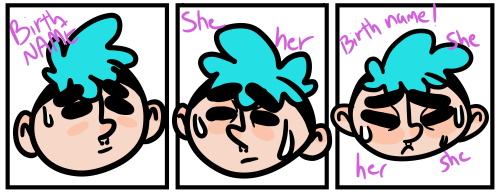
Person A: Oh, hey
Alex! What's up?"
Person B: Oh, um.. I don't actually go by Alex
anymore. My name is Luna."
Person A: Pffft! Haha! Well, you've always been
Alex to me. So, I'll just call you Alex."
Person B: Oh? Well then, from now on, why don't I
just call you Asshole."
Why Deadnaming is Harmful
When you refer to a
transgender person by their non-affirmed name, it can
feel invalidating. It can cause them to feel like you
don’t respect their identity, you don’t support their
transition, or that you don’t wish to put forth the
effort to make this necessary change.
If you do so in front of
people who are not in the know, it can effectively “out”
the transgender person. This may or may not be something
that they want other people to know. Not only can being
outed cause stress, it can also subject that person to
harassment and discrimination.
For transgender people, a
name change is an integral part of their struggle to
determine and affirm their identities. Deadnaming
reminds the person of their former
name (and former
life) and invalidates their efforts to be their
authentic self. It has the potential to bring forth
painful or embarrassing memories and dig up a past that
they would much rather forget. A transgender person
experiences some dysphoria at the mere thought of anyone
knowing their given name or assigned gender.
Some transgender people,
after having self-determined their identity or after
they have transitioned, no longer refer to themselves as
transgender. Instead they simply refer to themselves by
their correct and true gender.
Even if some acts of
deadnaming and misgendering are due to insensitivity,
carelessness, and ignorance, it can be viewed as a form
of transphobia and as psychological violence.
Deadnaming a Trans Person is
Psychological Violence
Why is Deadnaming Harmful?
Don’t Deadname Caitlyn Jenner
Info: Transgender Issues
What Does 'Deadname' Mean?
Deadnaming: Referring to Myself in Past
Tense
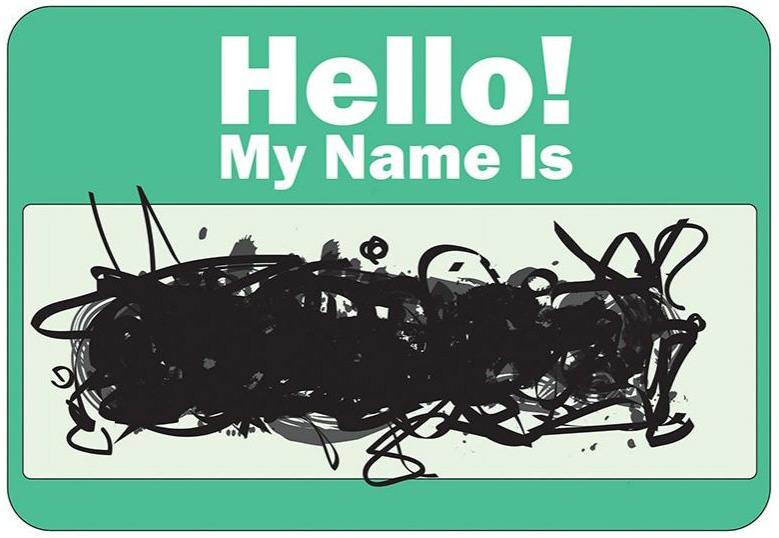
Using Trans Name: Matter of Life and Death
Using transgender
people’s correct name is literally a matter of life and
death. A new study found that transgender people who are
referred to with the correct name are at a lower risk of
suicide.
Stephen Russell of the University of Texas at Austin, et
al., interviewed 129 transgender and non-binary people
between the ages of 15 and 21. He asked them if they
could go by their actual name at home, at school, at
work, and with their friends, and also asked them
questions about suicide.
Compared to participants who had to go by their birth
name in all four domains, those who could go by their
actual name were 34% less likely to report thoughts of
suicide and 65% less likely to attempt suicide. Those
who could go by their real names experienced 71% fewer
symptoms of depression.
“I’ve been doing research on LGBTQ youth for almost 20
years now, and even I was surprised by how clear that
link was,” Russell said.
The researchers found participants in three major cities
and said that his sample was diverse in terms of
socioeconomic class and race. They controlled for those
factors when analyzing the results and also for social
support.
“It’s practical to support young people in using the
name that they choose,” Russell said. “It’s respectful
and developmentally appropriate.”
This is another reason it’s important to fight
discrimination at work, to force schools to respect
trans students’ gender identities, and for people to
refer to use the right names for the transgender people
in their lives: for some people, it can be a matter of
life and death.
[Source: Alex
Bollinger, LGBTQ Nation, April 2018]
Words Matter: Deadnaming and Suicide
Info: Preferred Gender Pronouns
We Need to Stop Deadnaming Trans People
Video: Misgendering is an Act of Violence
Info: Respectful Language
What Does 'Deadname' Mean?
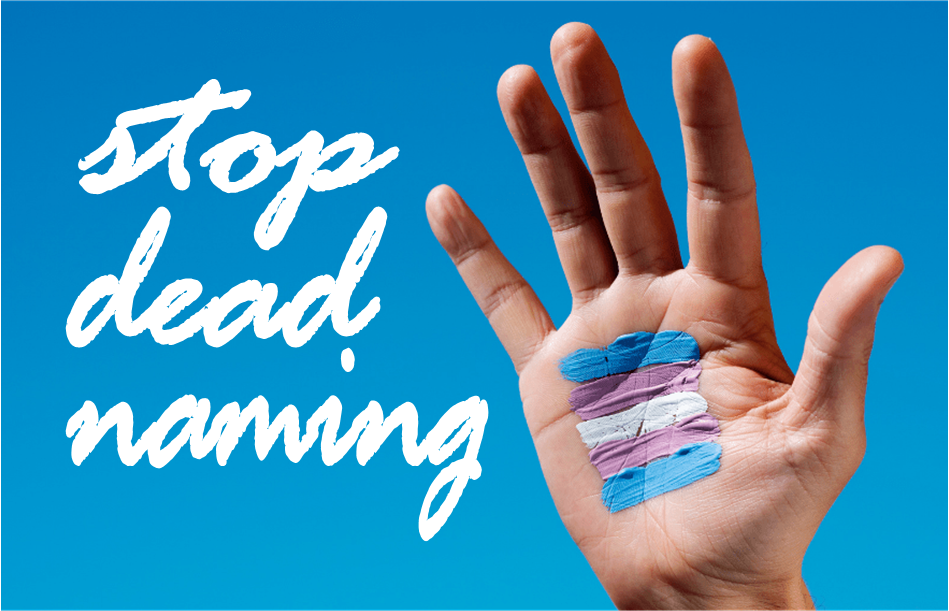
Are You a Trans Ally?
If you are an ally and
you deadname or misgender someone, we can agree that
your unfortunate mis-step was unintentional, mistaken,
accidental, not deliberate, erroneous, and inadvertent.
And your words will have unintended consequences.
But, because you are an ally, you acknowledge your error
and apologize.
But, what happens when you
deliberately deadname or misgender someone? What message are you
sending when you ignore someone’s preferred name or
gender pronouns?
--I can hear you talking,
but I’m not really listening to you.
--I know you better than
you know yourself.
--I know what’s best for
you.
--Being who you truly are
is an inconvenience to me.
--I would rather hurt you
than change the way I speak about you.
--Your sense of safety is
not important to me.
--Your feelings of
authenticity are not important to me.
--Your identity isn’t
real and should not be acknowledged.
--Offending you is fine
if it makes me feel more comfortable.
--Showing you respect is
not a priority to me.
--I want to teach
everyone around me to disrespect you.
--Why don’t you quit
being so sensitive and stop your whining.
--I would prefer it if
you stopped being honest with me.
--I am not an ally or a
friend.
--I am not someone you
can trust.
--I do not care about
you.
Deadnaming a Trans Person is
Psychological Violence
James: Starbucks Trans Ad
Finding Your Name
Why is Deadnaming Harmful?
Don’t Deadname Caitlyn Jenner
Deadnaming: Referring to Myself in Past
Tense
Words Matter: Deadnaming and Suicide
We Need to Stop Deadnaming Trans People
Video: Misgendering is an Act of Violence
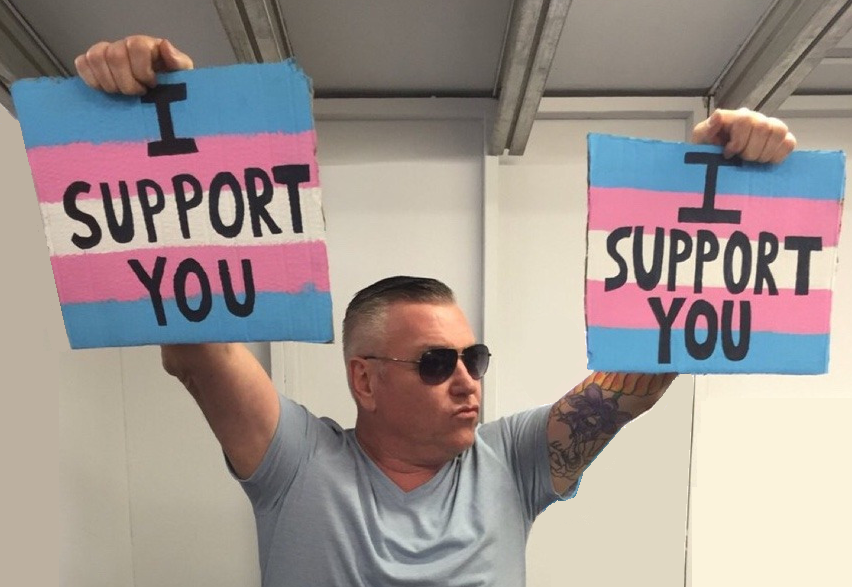
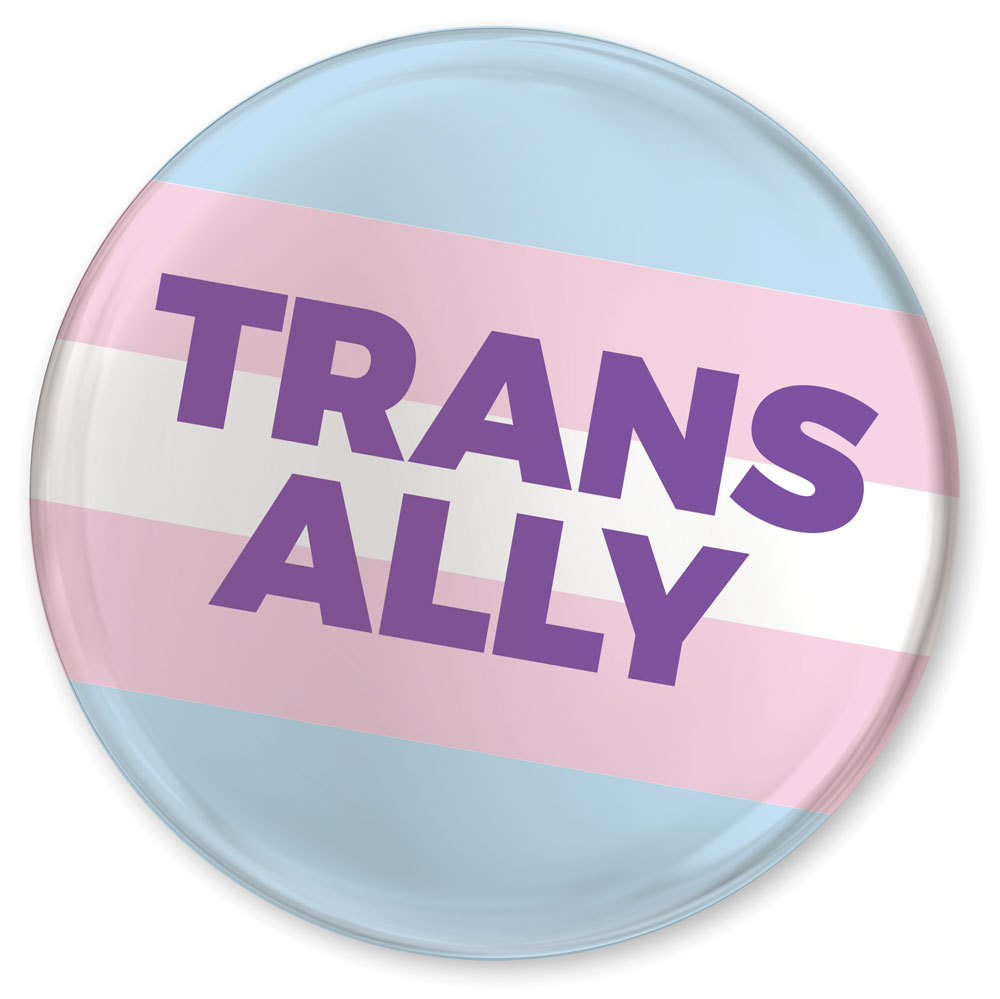
Reciprocity and Understanding
We expect that cis/straight
allies are sincere in their effort to extend respect and
affirmation to transgender and genderqueer people. We
expect that they understand why it is important to use
the proper pronouns and the proper name when referring
to or interacting with a transgender or genderqueer
person. We expect that they are aware of the harm that
can be done when someone deadnames a trans person or
uses the wrong pronouns. And we expect that they
are trying their best to do the right thing on behalf of
transgender and genderqueer people.
In the
spirit of reciprocity, we also expect that transgender
and genderqueer people will extend the same courtesy and
respect to cis/straight allies. We expect that
transgender and genderqueer people will be patient and
understanding of mistakes and mis-steps made by cis/straight
allies. We expect that they are aware that cis/straight
allies, while sincere in the effort to offer support and
affirmation, are not perfect and that they will
sometimes make mistakes. We expect that
transgender and genderqueer people understand that such
errors by cis/straight allies are unintentional and
accidental.
Please
remember, cis/straight allies are friends of the LGBTQ
community. They are not hostile, mean-spirited,
judgmental, or callous, but, in fact, seek to be
respectful, empathetic, and supportive regarding LGBTQ
people. They are not ignorant or uniformed, but, in
fact, are very educated regarding LGBTQ issues and
concerns. But they are also human, they are flawed, and
they are not perfect. Cut them some slack. They do not
need to be regarded in the same light as those who
purposefully, intentionally, and with conscious malice,
cause distress to LGBTQ people. Such anti-LGBTQ people
are ignorant and hateful and typically hold unhealthy
attitudes and dangerous beliefs regarding LGBTQ people.
How to be a Trans Ally
Basic Trans Ally Manners
Info: LGBTQ Straight Allies
What Does 'Deadname' Mean?
Cis and Flawed: Being a Good Trans Ally
Being a Trans Ally
Info: Preferred Pronouns

Comments About Deadnaming
“Calling a trans person
by their former name is referred to as deadnaming and is
considered highly offensive to most trans people I
know.”
-Steven Petrow
"I think selecting a name
and hearing people refer to me with that name was pretty
solidifying in the transition process. It made me feel
like I was being seen as the man I was presenting myself
as. When I finally got my legal documentation changed
over to reflect my chosen name, it was a major deal.
Yes, it's time-consuming and frustrating, but it's so
worth it in the end. I no longer get strange looks when
I present my ID card or license."
-Caleb Camacho
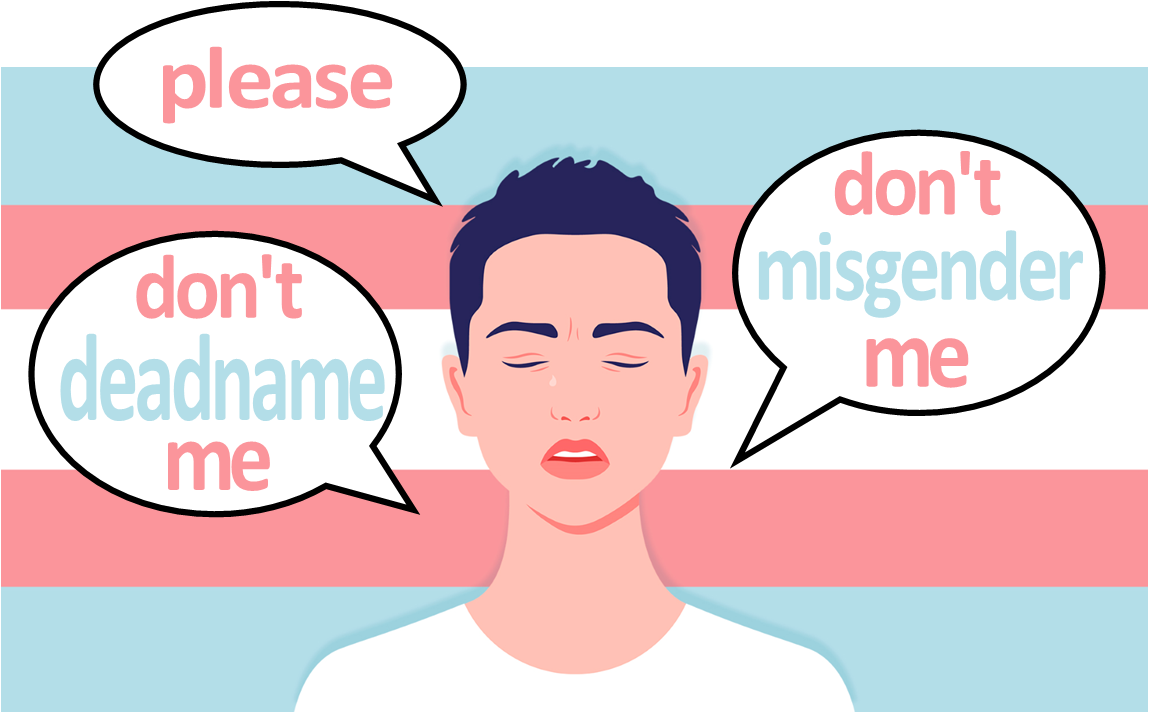
“For transgender people,
our relationships to our names are complicated, to say
the least. What we’re called has power, and hearing a
blatantly masculine or feminine name applied to you when
you’re trying to realign your gender in a different
direction can be a source of profound, dysphoria-inducing
anxiety. Hearing or seeing one’s old name can induce a
visceral sense of terror that no matter how much
progress one makes in their transition, the person they
used to be (or pretended to be) is still there. One’s
deadname is a name that shall not be spoken, for it
invokes a restless spirit. Many trans people will go to
great lengths to prevent people from finding out their
deadnames, destroying irreplaceable photos and documents
in an effort to ensure that who they really are is the
only identity most will remember. We may not be able to
make our families forget what they used to call us, but
we can change how we’re known to the rest of the world.”
-Samantha Riedel
“Deadnaming and
misgendering trans people is an act of violence.”
-Laverne Cox
“In my experience,
dead-naming can show a lack of respect for that person's
identity. For those who have just begun their
transition, especially, it can also cause pretty bad dysphoria and self-doubt and anxiety and a whole list of
emotions that no one should have to deal with. During
the first couple of years of my transition, it didn't
really bother me too much, especially with my family. It
took a while for my family to fully accept my
transition, so I was understanding of the fact that it
would take time for them to get used to referring to me
by my preferred name. After all, they'd spent
20-something years calling me by my dead name. Now,
since I've been transitioning for more than four years,
I get a bit annoyed if they slip up, and then I remind
them that my name is Caleb. It doesn't happen too often
anymore, though."
-Caleb Camacho
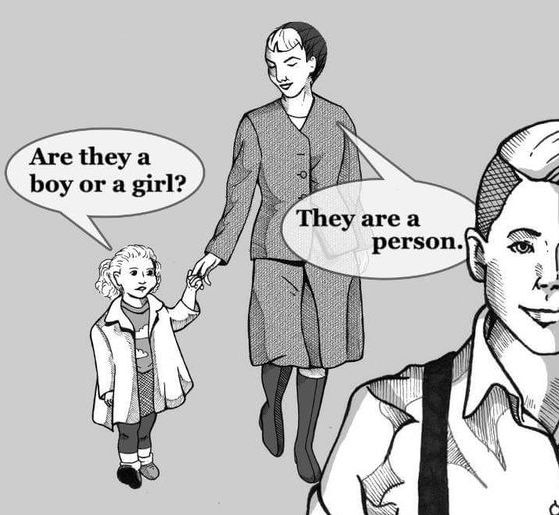
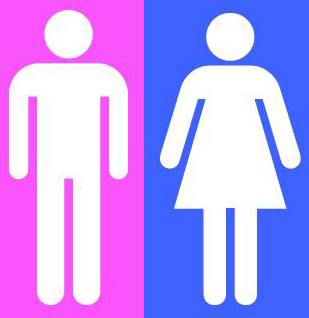
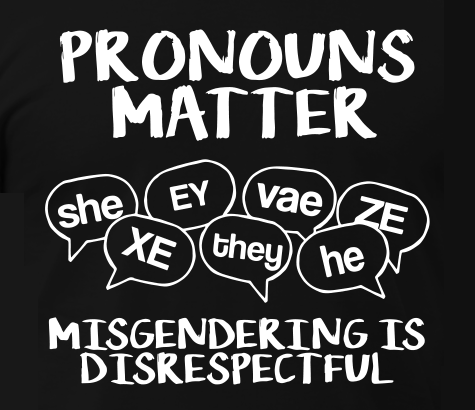
“When I first went full
time, I gathered up every piece of clothing I owned from
my previous life and I put it in a box. On that box I
wrote my dead name. It felt like packing up after a
loved one has died. It took me a weekend to fill the box
and the whole time I was filling the box I grieved. That
chapter in my life is over. Those things belong to...
someone else. Someone I never really was but pretended
to be for thirty years. That life wasn't all bad. Some
of the things that went in that box were sentimental.
Some of those things represented accomplishments and
journeys I had taken. But I don't connect to those
things the same way anymore. And so I grieved. So I
packed everything away, as though I had died, and I
grieved for what I was leaving behind. I think that the
grieving was important. Choosing to transition is a
choice to leave some things behind. Filling the box was
a time when I could grieve for those things. I still
have the box in the closet with my dead name on it.
There are things in the box too precious to part with,
and those memories will always be part of me. But I'm
not that person any more. I've grieved for that person,
but now I've moved on. I think dead name is an
entirely appropriate way to refer to a name and an
identity that has passed and been mourned, don't you?”
-Jae Alexis Lee
“For the most part, you
should never use a trans person’s birth name (or, as
some of us often call it, dead name) and you should
always stick with the pronouns they’ve asked you to use.
It’s important to understand they didn’t become who they
are the moment they told you their chosen name. And they
didn’t become this person because they transitioned.
Instead, they transitioned because they already were
this person. When you’re talking about their past, even
though you may not have known them as the person they
are now, this is still the person they were. For
example, I’ve always been Amelia. I may not have gone by
this name in the past, but this was always the person I
was inside, even if I was hiding it as much as possible
and pretending to be someone else. Also, it’s never okay
to out a trans person. Depending on the company you’re
in, it’s possible, perhaps even likely, that not
everyone is aware this person is transgender and they
would like to keep it that way. While I’m 100% openly
transgender, it’s still not okay for someone else to out
me. Even if it’s pretty obvious to someone else that I’m
trans, no one else has the right to confirm that
information. Maybe I don’t want to actually talk about
trans stuff at that time. Maybe my safety could be at
risk, which is not something anyone else is in a
position to evaluate. Maybe there’s just no reason why
that person needs to know I’m trans.”
-Amelia Gapin
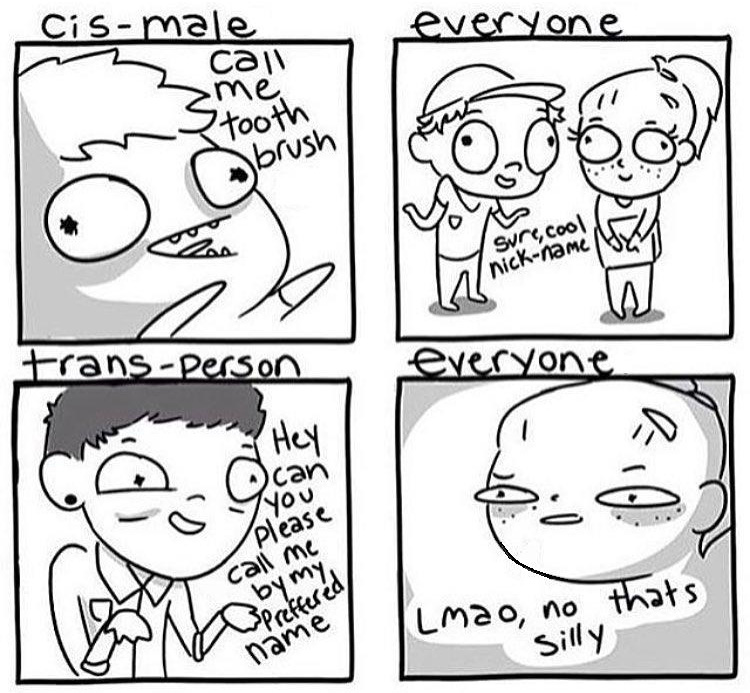
Deadnaming a Trans Person is
Psychological Violence
Why is Deadnaming Harmful?
Don’t Deadname Caitlyn Jenner
Info: Transgender Issues
Finding Your Name
Health Line: What Does It Mean to
Misgender Someone?
Deadnaming: Referring to Myself in Past
Tense
Words Matter: Deadnaming and Suicide
Info: Preferred Gender Pronouns
We Need to Stop Deadnaming Trans People
Video: Misgendering is an Act of Violence
Info: Respectful Language
Transgender Terminology
AMAB – Assigned Male at
Birth.
AFAB – Assigned Female at
Birth.
Doxxing - Dropping
documents. Collecting and revealing personal and private
information about a person's past. Releasing
embarrassing information publicity against a person's
wishes. Defaming, harassing, and outing a person by
revealing past hidden information about them.
TERF – Trans Exclusionary
Radical Feminist. Women who oppose the inclusive of
transgender women in spaces exclusively reserved for
women assigned female at birth.
Clocking - Term used to
reflect that a transgender person has been recognized as
trans, usually when that person is trying to blend in
with cisgender people, and not intending to be seen as
anything other than the gender they present. The term is
typically used by presentation-focused trans men and
women to explain the crushing disappointment they feel,
usually when cisgender people “out” them, but also when
someone trans does it. Another word is "read," as in
"She read me," or "I got read as trans." It should be
noted not all trans people can or want to “blend in” or
"pass" to avoid being “clocked,” and many make peace
with their gender presentation being at odds with what
society dictates a man or woman "should" look like.

Passing – For those whose
aim is to be accepted as the gender with which they
identify, “passing” is considered a worthy goal, and at
the same time a very arbitrary determinant. “Passing” is
to “blend-in,” and like beauty, can vary depending on
the eye of the beholder. For many trans people, the
pursuit of "passing" is rooted in a desire for safety.
Sex Change – The term is
far from accurate and not generally preferred. To many
in the trans community, it can be an insulting term.
To those looking in from
the outside, "sex change" seems to be the perfect
description: one day you’re a woman, now you’re a man.
You changed your sex. Well, not really. To understand
why “sex change” is a terrible thing to say, understand
that “sex” is a stand-in for the word “gender.” Gender
doesn’t really change when someone undergoes an
operation that for decades was commonly called a “sex
change,” or more recently, “sexual reassignment
surgery.” Someone who identifies as female (regardless
of their sex assigned at birth) doesn’t change, so much
as work to align their physical appearance and anatomy
with the gender they know themselves to be.
That’s why the term
“gender reassignment” came about, to better explain that
a person assigned male at birth was given a treatment or
surgery to live as a female. But that, too, raised
heckles, and that is where we get the terms “gender
confirmation surgery” and “gender affirming surgery,”
two more accepted terms that emphasize the treatment and
surgery not so much as a transformation but as an
acknowledgement that the mind and body needed
realignment.
Deadnaming a Trans Person is
Psychological Violence
James: Starbucks Trans Ad
Why is Deadnaming Harmful?
Don’t Deadname Caitlyn Jenner
Deadnaming: Referring to Myself in Past
Tense
What Does 'Deadname' Mean?
Laverne Cox: Deadnaming and Misgendering Trans People
Words Matter: Deadnaming and Suicide
Health Line: What Does It Mean to
Misgender Someone?
We Need to Stop Deadnaming Trans People
Video: Misgendering is an Act of Violence
HOME
QUEER CAFE
│ LGBTQ Information Network │ Established 2017 |